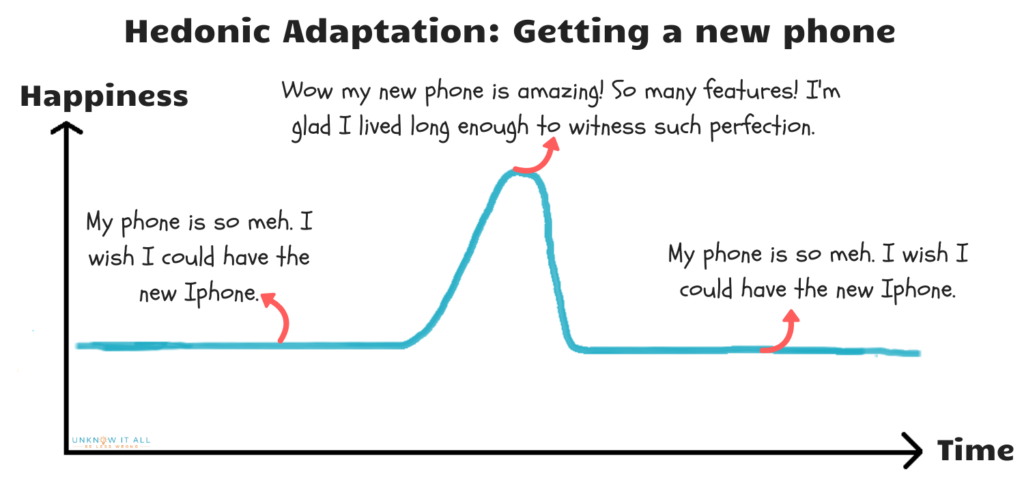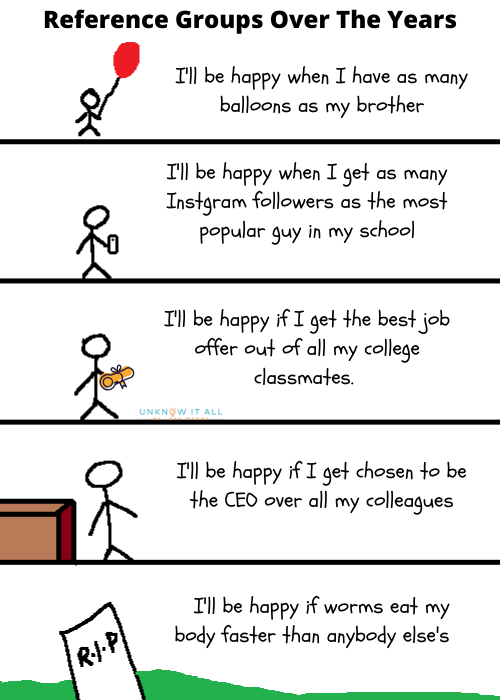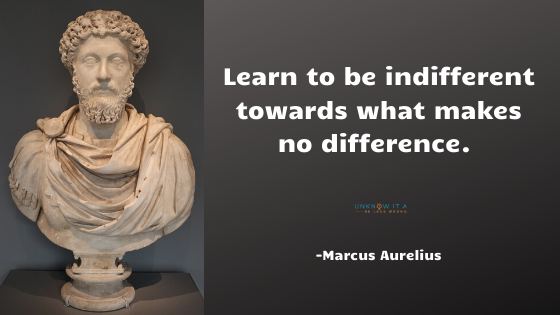Achieving your goals will not make you happy.
Say what?
Most of us live in societies that prize material wealth, achievement and outward indicators of success. From the time we’re children, we’re taught to believe in the importance of accomplishing certain milestones: do well in school, go to college, get married to the right person, work in a prestigious career and then repeat the cycle with equally milestone-achieving kids.
The formula for happiness as we understand it goes like this: work hard, become successful, be happy.
Except for one small thing. Happiness doesn’t work that way. Some of the most outwardly successful people are the also some of the unhappiest.
The best example would be celebrities. Despite all their fame, wealth and glory, so many of them battle with drug and alcohol addictions and go go through endless breakups and divorces. We may think that these people are the exception to the rule and that their failure to be happy is a personal failing. The truth is a lot of us would be the same way if we had to live their lives.

The problem: We’ve got our happiness equation backwards. It’s time to unknow that success causes happiness. It’s happiness that causes true success.
What is happiness?
There are two kinds of feelings that we normally refer to as happiness:
Pleasure: The human brain is wired to seek pleasure. Eating that bag of potato chips that is bad for us, the enjoyment of getting a promotion and making more money, watching a good movie etc. There’s absolutely nothing wrong with experiencing pleasure. Our obsession with pleasure, however, leads to more misery than it does anything else.
Contentment: This means having an overall sense of satisfaction about yourself and your life. A lot of societies (especially western ones) have an uneasy relationship with contentment. Some believe that experiencing a lot of pleasure will eventually lead to contentment. They are mistaken. Pleasure and contentment have nothing to do with each other. Others think that contentment is a sign of mediocrity and a lack of ambition:
Show me a thoroughly satisfied man, and I’ll show you a failure. –
Thomas A. Edison
Despite this contempt for contentment, allow me to explain why it’s a far better aim than pleasure.
Why success won’t lead to happiness aka “Why pleasure sucks”:
1. Hedonic Adaptation
There’s a problem with getting exactly what we want. It’s that we don’t think much of it after we get it.
Take chocolate cake for example. The first slice? Amazing. The second slice? Good. The third? You’re disgusted with both yourself and the cake.
Think about how you once lusted after a new phone. For the first few weeks after buying it, you treated it like a newborn baby. You put it down gently and wiped every speck of dust that dared to settle on the screen. A few months later, you were fine tossing it on to your sofa like a tennis ball.

This process of getting used to things that were once all-consuming in their appeal to us is called hedonic adaptation. No matter how much we fiercely desired something, after we get it, it just becomes our new normal. We then return to our previous state of (un)happiness and start desiring something else.
A lot of people have some vague understanding of this. Sooner or later, they learn not to associate happiness and success with acquiring material objects. But they then turn to a new idea of success, which is usually one of these of 2 things:
- Acquiring experiences
- Acquiring achievements
The problem is that both experiences and achievements are subject to hedonic adaptation as well.
Experiences
There is a wide-spread admonition on social media to “collect experiences, not things.” It’s undoubtedly good advice. (The cynical part of me though wonders how much of its popularity comes from corporate propaganda. Businesses need new ways to get us to spend our money once we’ve exhausted our desire for material objects.)
In any case, collecting experiences has become enough of a thing to generate a new term: #FOMO or “Fear of Missing Out” on what other people are doing. A lot of us feel like we will only be happy if we travel, go to parties, meet other people and in general do all the things that everybody else on our social media timelines are doing. We’re too caught up in our fear to realize that no amount of experiences we have will ever get rid of it.

Also, while experiences may definitely be a more useful thing to collect than material objects, the way that we (millennials especially) typically do it is ridiculous. There are quite a few of us who mainly value having experiences so that we can post about it later on Instagram and Facebook. The point of going through experiences is for us to have fun and grow as people, not to brand ourselves as cool and “with it”. If we go on camping, and the happiest we felt was after the trip (seeing all the likes and comments we got posting about it on Instagram), we wasted our time.
Achievements
This was my drug of choice for a long time. One of my childhood dreams was to study at an Ivy-League university. I made sure I kept my grades high.
Well, I eventually did study at an Ivy-league university.
After the euphoria of the first few weeks passed, being there just (shocker)…became my new normal. My focus had shifted – I now needed to get good grades. I needed to figure out what the hell I wanted to do in life.
No matter what scale of achievement we have, it will never be enough to bring lasting happiness. We just consumed by another, even bigger goal. We should not delude ourselves that we’ll abandon the rat-race once we finally achieve our one big dream.
2. Reference Groups
Which of these options would you prefer?
- You get a salary increase of $1000 while your colleagues get an increase of $500
- You get a salary increase of $1500 while your colleagues get an increase of $2000.
Go with your gut instinct.
Most people probably went for the first. This is despite being perfectly able to do basic math and realizing that what they get in the first ($1000) is less than in the second ($1500). One not-so-nice thing about people is that for a lot of us, our happiness comes from feeling superior (or at least equal to) those around us. These people form our reference group – they’re typically friends, colleagues, and career role-models.
Reference group pose a big problem when we’re chasing after goals and achievements. As we raise the bar for ourselves with each accomplishment, our reference group also becomes increasingly more elite. It becomes harder and harder to keep up with them. Sooner or later, no matter how much success we have already had, we look at the people around us and feel like a failure.
This is the reason why even billionaires are never quite happy with their wealth and achievements. They’re not comparing themselves with regular people. They’re comparing themselves to even richer billionaires and feeling inadequate in comparison.

3. Post-Achievement Depression
What’s your biggest and wildest dream?
Winning a Nobel Prize? Becoming a millionaire/billionaire/gazillionaire? Creating your start-up?
Whatever it is, you might be better off not achieving it. The day that you feel you have peaked in achievement can be the start of a terrible life crisis.
Look at Olympic athletes. For a lot of them, including Michael Phelps, winning an Olympic medal led to a few days of intense joy… and then clinical depression. When you base your entire identity and purpose in life on striving for an Olympic medal, you have no idea what to do next after you get it.
Another example would be the astronaut Buzz Aldrin. He was the second “man on the moon” after Neil Armstrong. After returning to earth, he descended into depression and alcoholism. In his words: “I wanted to resume my duties, but there were no duties to resume. There was no goal, no sense of calling, no project worth pouring myself into.”
Even those that encourage you to relentlessly pursue success are aware of the post-achievement blues. Entrepreneur extraordinaire Gary Vaynerchuk, the patron saint of “hustle” himself, acknowledges that the saddest day of his life will be when he succeeds in his biggest dream of buying the New York Jets ( that’s an American football team, for those who don’t care about sports.)
If you think that this a problem that is limited to extreme high-achievers, think again. It affects a lot of ordinary people too when they have to retire. People tend to mentally and physically deteriorate much faster after they retire because they have no idea what to do with themselves once their glory days of work are behind them.

The Paradox of Happiness
Taken together, these three problems (hedonic adaptation, constantly comparing ourselves with our reference group, and post-achievement depression) create the pleasure paradox. If we chase after pleasure directly through whatever means – accumulating personal achievements, material wealth, or experiences- we will never be happy. In fact, the opposite happens: we become miserable.

Since searching for pleasure is ultimately a fool’s errand, attaining contentment is a wiser goal. The path to contentment is pretty much the opposite of what we’ve been taught to do though. If pleasure is about reaching out and enjoying what the world has to offer us, contentment is about going within and enjoying what we have to offer ourselves. It is the by-product of living a meaningful and purposeful existence.
How to achieve both success and happiness
If you want to both success and happiness, stop:
- Mindlessly chasing pleasure. (This doesn’t mean to never experience pleasure again. That’d be terrible advice. Instead, become aware that you’re seeking pleasure in that moment and examine why.)
- Expecting your achievements to bring you happiness, validation or a feeling of self-worth.
- Defining success as to how many milestones you achieve.

Instead, start making yourself into a person who
- Makes you happy to be you
- Appreciates what you already have.
- Contributes to a purpose outside of yourself
This is a process that is simple, but not easy. Shifting from clear external markers of success to these kinds of personal and intangible markers requires a fair bit of courage. That’s what makes it all the more worthwhile.
Become someone who makes you happy to be you
You may have thought that since I started this post by saying “Achieving your goals will not make you happy” that I was telling you to never have goals again. Not so fast.
Goals are not inherently bad in themselves. The true benefit of a goal, however, is not the outcome. It is who you become while working towards it.
Why isn’t the outcome important? Because it’s not 100% within our control – there’s nothing we can do to ensure things go exactly as we want. Luck, chance and fate always have a role to play. The moment we start stressing about things outside our control we doom ourselves to unhappiness. Instead, we should focus on the skills that we gain from working on our goals, without caring about the outcome either way.
Preferred Indifferents
To achieve this state of mind, I’ve found the concept of “preferred indifferents” in the philosophy of Stoicism very useful. While we may prefer to succeed rather than fail in our endeavours, we can also become ultimately indifferent between the two. When we learn through enough personal experience that success does not lead to happiness, meaning or virtue, we realize that we can live without success and still be OK.

I have adopted this mindset about my writing. I’ve made my peace with both possible outcomes:
- That I will have thousands of readers and subscribers.
- That the only reader and subscriber I have is my mother.
Instead, I write and blog mainly for the skills it teaches me – how to create engaging content, how to be internally motivated and self-disciplined, how to not procrastinate, and how to promote my work without feeling like I’m selling out. Knowing that I’m growing and actively making myself into the person I want to be is the best form of contentment (and success) there is.
Appreciate what you already have.
I’m sure you’ve heard about the importance of gratitude. I’m not here to tell you differently. Regularly experiencing gratitude is one of the most important skills we can teach ourselves. Loads of psychology research say there’s little happiness without it.

Of course, there’s no point being thankful just once a year for all your blessings. You have to regularly experience gratitude for it to have an impact. Some of the tips and tricks o start a regular gratitude practice that I’ve found useful are:
- When you wake up in the morning, come up with 3 things that you’re grateful for. Anything from your family to the fact that you have running water counts. Vary it up each day so that you don’t get bored. It’s better to write these down in a journal, but if you’re too lazy, saying them to yourself works too.
- When you’re in an annoying situation, like being stuck in a traffic jam or having a flight delayed, you can avoid getting irritated if you focus on the things that are going right instead. Use the time to come up with all the things you’re grateful for in your life and get your gratitude practice checked off your to-do-list for the day.
- If these don’t bring you enough of a sense of gratitude, then imagine yourself losing all that you have. Imagine losing your job, your house burning down, your partner dying and your children never speaking to you again. That should bring the gratitude real quick.
Contribute to a purpose outside of yourself
There is a reason why every religion in the world advocates charity. Aside from being a nice thing to do, it’s a psychological fact that we feel happier when we give rather than we receive.
Sooner or later, most of us come to a point where we find focusing on just ourselves and our accomplishments to be empty and meaningless. It’s why Bill Gates started giving away his fortune through his foundation. It’s why your grandma feels unhappy if she can’t feed you.
This is why it’s important to have work where you feel like you are helping others in some way. Even if you’re broke or stuck in a bullshit job, you can still contribute to the well-being of those around you with your time and your energy. If your goals serve only yourself, achieving them will not make you happy.
I can personally speak to the importance of contribution. A few years ago, this was how I woke up every morning:

Obviously, I’m much changed now, otherwise I wouldn’t be writing this. Not to say things are 100% peachy keen all the time – I have days when my writer’s block is really bad and I want to smash my laptop against the wall. What keeps me going now, happy through it all, is the feeling that I may be helping others with my writing. Knowing like I’m a part of something bigger than me makes me less focused on my problems and makes everything seem more manageable.
We must try to contribute joy to the world. That is true no matter what our problems, our health, our circumstances. We must try. I didn’t always know this and am happy I lived long enough to find it out.” – Roger Ebert
Success and Happiness: Putting It All Together
For those who like stuff condensed:
Rather than expecting success to bring you happiness, design your life in such a way that your happiness brings you success. To do this, you need to ask yourself:
- What do I really want in life? What do I value? (Read this post to help you along.)
- Which goals can I create that align with my values?
- Which skills would working towards this goal teach me? What kind of person would I be at the end of it, whether I succeed or fail?
- What can I do to keep reminding myself to focus on the process rather than the outcome? (e.g. setting daily reminders on your phone, posting sticky notes to the fridge door etc.)
- What kind of regular gratitude practice can I start to keep track of what I already have?
- How can I contribute to the well-being of others with what I’m doing?
Then go forth and prosper knowing that you have leveled up in life where it truly counts. You have become a rare kind of human being: someone who is familiar with both success and happiness.

